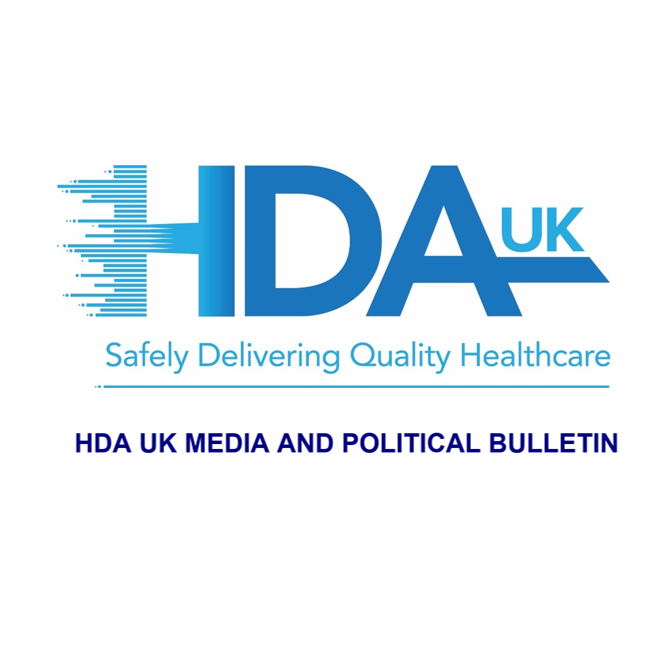News
HDA UK Media and Political Bulletin – 10 May 2024
Media Coverage
More than 90% of pharmacies say medicines shortages have got worse over the past year
The Pharmaceutical Journal, Saša Janković, 9 May 2024
The Pharmaceutical Journal reports on Community Pharmacy England’s national Pharmacy Pressures Survey 2024: Medicines Supply Report which found that 94% of pharmacy owners spend more time sourcing medicines now than at the same point in 2023. 84% of respondents reported spending longer than ever sourcing medicines.
Janet Morrison, Chief Executive of Community Pharmacy England, described the current medicine supply challenge as “beyond critical” and said the report makes “distressing reading” and “should be ringing alarm bells”.
William Pett, Head of Policy and Research at Healthwatch England, called for “a review of the medicine supply chain to ensure safety and resilience, and for pharmacy teams to be given flexibility…to make changes to medicines they dispense in collaboration with patients”.
This report was also reported on by P3pharmacy, Dispensing Doctors’ Association and ITV News.
Parliamentary Coverage
MHRA launches AI Airlock to address challenges for regulating medical devices that use Artificial Intelligence
Medicines and Healthcare products Regulatory Agency, 9 May 2024
The Medicines and Healthcare products Regulatory Agency (MHRA) has today launched AI Airlock, a new regulatory sandbox to help with the safe development and deployment of AI medical devices (AIaMD) by addressing novel regulatory challenges.
Dr Paul Campbell, Head of Software and AI at the MHRA, welcomed the tool’s launch noting that the Agency is “currently seeing a marked increase in innovative AIaMD products entering the UK market” and reinforced the Agency’s aim to “balance appropriate oversight to protect patient safety with the agility needed to respond to the particular challenges presented by these products”.
Carbamazepine
Catherine West MP (Labour, Hornsey and Wood Green): To ask the Secretary of State for Health and Social Care, whether she has had recent discussions with Novartis on the adequacy of supply of the epilepsy medication Tegretol.
Andrew Stephenson MP (Conservative, Pendle): The Department has been working intensively to address issues with the supply of some epilepsy medications, and as a result we have helped to resolve issues with Tegretol 200 milligram and 400 milligram prolonged release tablets, and Tegretol 100 milligram immediate release tablets. We are aware of a shortage of Tegretol 100 milligram/5 millilitre liquid, but have been advised that resupplies are expected this month. We are continuing to work closely with manufacturers, including Novartis, to help ensure the continued supply of these medicines for patients in the United Kingdom, for example by asking suppliers to expedite deliveries.
Whilst we can’t always prevent supply issues, we have a range of well-established tools and processes to mitigate risks to patients. These include close and regular engagement with suppliers, use of alternative strengths or forms of a medicine to allow patients to remain on the same product, expediting regulatory procedures, sourcing unlicensed imports from abroad, adding products to the restricted exports and hoarding list, use of Serious Shortage Protocols, and issuing National Health Service communications to provide management advice and information on the issue to healthcare professionals, so they can advise and support their patients.
Pharmacy: Drugs
Catherine West MP (Labour, Hornsey and Wood Green): To ask the Secretary of State for Health and Social Care, what steps she is taking to help tackle shortages of medicines in pharmacies.
Andrew Stephenson MP (Conservative, Pendle): The Department has a responsibility to work with United Kingdom medicine license holders, to help ensure continuity of supply. We monitor and manage medicine supply at a national level, so that stocks remain available to meet regional and local demand. There are approximately 14,000 medicines licensed for supply in the UK, and the overwhelming majority are in good supply. The medicine supply chain is complex, global, and highly regulated, and supply issues can be caused by a range of factors. For example, suppliers can encounter manufacturing problems, difficulty accessing raw materials, and surges in demand. These are commonly cited as the drivers of recent supply issues, which have affected many countries, not just the UK.
Whilst we can’t always prevent supply issues, we have a range of well-established tools and processes to mitigate risks to patients at a national level. These include close and regular engagement with suppliers, use of alternative strengths or forms of a medicine to allow patients to remain on the same product, expediting regulatory procedures, sourcing unlicensed imports from abroad, adding products to the restricted exports and hoarding list, use of Serious Shortage Protocols, and issuing National Health Service communications to provide management advice and information on the issue to healthcare professionals including pharmacists, so they can advise and support their patients.
Full Coverage
More than 90% of pharmacies say medicines shortages have got worse over the past year
The Pharmaceutical Journal, Saša Janković, 9 May 2024
The vast majority of community pharmacy owners have said that medicines shortages have got worse over the past year, a survey by Community Pharmacy England (CPE) has revealed.
The survey of more than 2,000 community staff members and the owners of more than 6,000 pharmacy premises, results of which were published on 9 May 2024, also revealed that medicines supply problems were affecting 99% of community pharmacies at least weekly, with 72% experiencing multiple shortages each day.
CPE’s ‘Pharmacy pressures survey: medicines supply report‘ also reported that 94% of pharmacy owners said their teams now spent more time sourcing medicines compared with the same point in 2023, while 84% said they were spending longer than ever before sourcing medicines.
The survey also revealed that 79% of pharmacy staff said that patient health was being put at risk owing to medicine supply issues, with 84% of team members experiencing aggression from patients as a result.
The report’s authors concluded that medicines across a range of clinical and therapeutic areas were being affected by supply disruptions at different times, with issues in 2024 affecting “in particular medicines used for the treatment of diabetes, ADHD, and epilepsy”, while there were “availability issues with HRT, adrenalines and antibiotics” in 2023.
Fin McCaul, managing director of Prestwich Pharmacy in Manchester, told The Pharmaceutical Journal: “This is the longest period of continuous disruption that I’ve ever experienced and it’s a constant issue. In the past, shortages were confined to one molecule but now they change from product to product to product in every disease area across the board, from cardiology and diabetes, to respiratory, pain, ADHD, mental health medicines.”
Anil Sharma, pharmacist and director of Medicines4U in Huntingdon, Cambridgeshire, told The Pharmaceutical Journal: “Sometimes up to 10% of things we place on order are coming up as out of stock and it’s costing us one to two hours a day of extra staffing time to resolve, even though these are really common drugs.
“We will try to order the drug two or three times but if we can’t get it by the third day we will ask the patient’s surgery for an alternative, but sometimes there is no clinically suitable alternative product, and this can end up being a matter of life or death for many patients.”
Describing the medicine supply challenges being faced by community pharmacies and their patients as “beyond critical”, Janet Morrison, chief executive of CPE, said the survey results “make distressing reading, and they should be ringing alarm bells for anybody interested in protecting the health and wellbeing of local communities and the public”.
“We’ve been warning for some time that these issues must be resolved, and this evidence provides yet another stark warning which must not be ignored,” she added.
In March 2024, The Pharmaceutical Journal revealed that manufacturers reported medicines shortages to the Department of Health and Social Care an average of 137 times per month in 2023, compared with 82 times per month in 2021.
Patient mouthpiece Healthwatch published research on medicines shortages in April 2024, which showed that 24% of patients had experienced their pharmacy not having stock of their medicines in the past year.
Responding to the results of CPE’s survey, William Pett, head of policy and research at Healthwatch England, said: “Healthwatch England hears about how shortages can lead to rationing and desperate instances of ‘pharmacy bingo’, where patients must travel from pharmacy to pharmacy looking for stock.
“We are calling for a review of the medicine supply chain to ensure safety and resilience, and for pharmacy teams to be given flexibility, where it is safe to do so, to make changes to medicines they dispense in collaboration with patients.”
A spokesperson for the Department of Health and Social Care said: “There are around 14,000 licensed medicines and the overwhelming majority are in good supply. Supply issues can arise for a wide range of reasons and are not specific to the UK.
“Our priority is to mitigate risks posed by those issues and to help ensure that patients continue to get the treatments they need. Thankfully, most issues can be managed with minimal impact to patients.
“We recognise the vital role pharmacies play in our healthcare system and that’s why they are backed by £2.6bn a year in government funding.”
MHRA launches AI Airlock to address challenges for regulating medical devices that use Artificial Intelligence
Medicines and Healthcare products Regulatory Agency, 9 May 2024
Last month, the MHRA set out its strategic approach to AI in response to a white paper published in 2023 by Government. This pilot project is a key part of that approach. It will help the Agency to identify and address the challenges for regulating standalone AI medical devices (AIaMD), initially seeking out and supporting 4-6 virtual or real-world projects through simulation. This will allow us to test a range of regulatory issues for these devices when they are used for direct clinical purposes within the NHS.
The regulatory sandbox model is a recognised mechanism to help address novel regulatory challenges across sectors. The AI Airlock is a world-leading version in healthcare, designed to assist in safe development and deployment of AIaMDs, and this project will follow that robust process so manufacturers can deliver what is required to ensure the real-world viability of these devices.
The MHRA’s regulatory AI Airlock takes into account evidence-based work produced by other bodies with a similar focus and we will work collaboratively with the NHS AI Lab and the Department of Health and Social Care (DHSC). AIaMD products are deployed via NHS infrastructure, making the Devolved Nations crucial to regulatory discussions around deployment and post-market surveillance.
The findings from this partnership between government, regulators and industry will inform future AI Airlock projects and influence future UK and international AIaMD guidance, including how we work with UK Approved Bodies on UKCA marking and with trusted regulatory partners on international recognition of medical devices.
Dr Paul Campbell, MHRA Head of Software and AI, said:
We are currently seeing a marked increase in innovative AIaMD products entering the UK market that have the potential to revolutionise the healthcare landscape and provide improved ways to address patient and public needs.
As a regulator, we must balance appropriate oversight to protect patient safety with the agility needed to respond to the particular challenges presented by these products to ensure we continue to be an enabler for innovation.
The launch of the AI Airlock will enhance our collective understanding and accelerate solutions to novel regulatory challenges, ultimately improving the experience of patients.
This fact-finding approach is key to safeguarding patients as we learn about the full potential of this technology. Where AI Airlock can enhance the relationship between developers and manufacturers with the MHRA as a regulatory body, in the future, it may also serve to support confidence in patient engagement and the safe use of AIaMD products.
MHRA’s regulatory sandbox is an expanding offering in the healthcare technology space, and investment in innovative solutions is underway to position the NHS as an industry leader by 2030.


